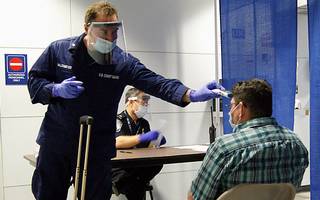WASHINGTON — The congressional Ebola hearing that prompted a mea culpa Thursday from a Dallas hospital executive also provided a megaphone for lawmakers eager to ban visitors from West Africa.
One after another, they prodded the nation’s top public health experts for affirmation that such a ban makes sense. Over and over, the experts declined.
“We would look at any proposal that would improve the safety of Americans,” said Dr. Tom Frieden, director of the Centers for Disease Control and Prevention.
It was a deflection. His disdain for a travel ban remained firm and unequivocal. He says such restrictions would aggravate the epidemic in West Africa, putting Americans at far greater risk in the long run.
But with widespread public fears, the drumbeat went on throughout the three-hour hearing.
“Screening and self-reporting at airports have been a demonstrated failure,” said Rep. Tim Murphy, the Pennsylvania Republican who chairs the House Energy and Commerce oversight subcommittee. “We do not have to leave the door open to all travel to and from hot zones in western Africa while Ebola is an unwelcome and dangerous stowaway on these flights.”
If Liberia, Sierra Leone and Guinea constitute a hot zone, Frieden was the man on a hot seat.
Heading into the hearing, it looked as though that honor might go to Dr. Daniel Varga from the hospital company whose Dallas branch bungled the case of Thomas Eric Duncan, the Liberian who died of Ebola last week.
Varga, appearing by video hookup from Dallas, apologized for the hospital’s many missteps, including those that left two nurses infected and fighting for their lives.
That seemed to mollify lawmakers. Most seemed far more eager to pounce on Frieden, whom they grilled on topic after topic.
Why didn’t CDC send a team to Dallas right away? Why did CDC tell nurse Amber Vinson it was OK to fly from Cleveland to Dallas with a low-grade fever?
Even the hospital’s failings fell on him. Why, they wondered, couldn’t he explain what went wrong that let the nurses catch the virus?
“Those first couple of days, there was some variability in the use of personal protective equipment,” Frieden said.
There was also, predictably, political posturing.
Rep. Marsha Blackburn, a Tennessee tea partier, picked up on Frieden’s comments about “porous borders” — he was referring to Liberia and its neighbors — to try to score points about the U.S.-Mexico border.
Frieden reiterated that he was talking about West Africa, so she tried again with a witness from Customs and Border Protection. She asked him if the Border Patrol (a sister agency) could better control Ebola “if we secured the southern border and eliminated illegal entry.”
Anyone entering across the southern or northern border would be asked about their travel history, he replied. That wasn’t helping her cause. She cut him off.
“Yes or no is sufficient. I need to move on,” she said.
With Frieden refusing to give ground on a travel ban, Rep. Morgan Griffith, R-Va., tried another tack: “Don’t you think we should at least restrict travel on dogs?” It wasn’t clear if he was kidding.
On the Democrats’ side, eyes were on Rep. Bruce Braley, who is locked in a tight U.S. Senate race in Iowa. He went out of his way to mention a home-state firm trying to create an Ebola vaccine.
“I know that they are working around-the-clock,” he said.
Republican Rep. Cory Gardner of Colorado — another Senate nominee on the subcommittee — questioned the efficacy of screening travelers from West Africa at only five U.S. airports. He offered some back-of-the-envelope math: The screening covers 94 percent of 150 daily arrivals. That leaves nine people entering the country every day through airports without heightened screening.
That’s more than 3,000 people per year.
Rep Michael Burgess, R-Lewisville, noted that the president has the authority to cut off travel under a 2005 law enacted in response to a bird flu pandemic.
“That authority very clearly exists,” he said. And if the president won’t exercise it, he added, Congress should.
On Twitter: @toddgillman









